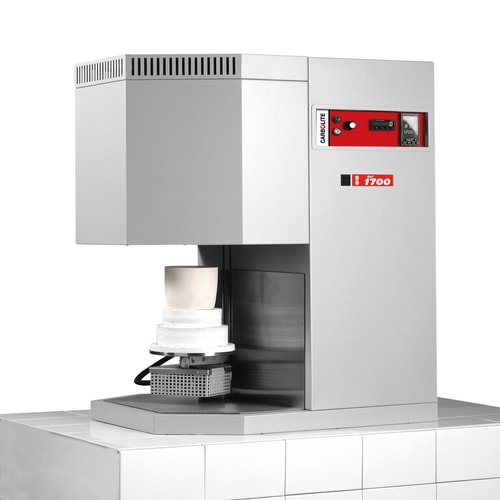Carbolite BLF 17/8 High-Temperature Bottom Loading Chamber Furnace, Floor Standing.
Carbolite Gero BLF 17 furnace consists of an electric hearth, that loads up into the chamber situated above, making it easy for loading fragile or heavy samples into the chamber. The hearth travel allows the full height of the chamber to be utilised. The hexagonal chamber consists of six walls total 250 x 200 mm diameter. On each wall molybdenum disilicide heating elements are located, giving all-round heating for maximum uniformity.
The chamber is a combination of refractory brick hot face insulation and low thermal mass insulation giving efficient heating and durability. The furnace is fitted with a 3216P1, eight segment digital programmer as standard. This controller can be upgraded to 20 segments with additional storage; please contact Norrscope for details. Over-temperature protection is also included as standard.
The bottom-loading design using an electrically operated elevator hearth allows for samples to be removed and placed back while hot or cold, insuring operator safety from radiated heat.
BLF 17/8 has a heat-up time of 80 minutes. Maximum power is 8130 watts. The maximum temperature is 1700C operate 100C below for continuous use.
- Applications sintering high-performance ceramics, melting glass under high temperature or working with modified atmospheres
- Uploading loading hearth design allows rapid furnace heating & cooling
- Hearth cage with safety interlock
- Surround heat allows for enhanced uniformity
Options
- BLF designated crucibles
- Special hearth allowing gas introduction for atmospheres, achieved by an inverted crucible positioned in a hearth groove (not gas-tight) the groove can be sealed with alumina (Al2O3) or Zirconia (ZrO2) powder. Gas inlet connection through the hearth surface, thus no blocking/interference from the sample directly on the hearth.
- Radiation shutter
- Insert of thermocouple or stirrer via chamber roof
- Rotating hearth possible
- Plasma sprayed alumina protection tube to protect heating elements from sample contamination

